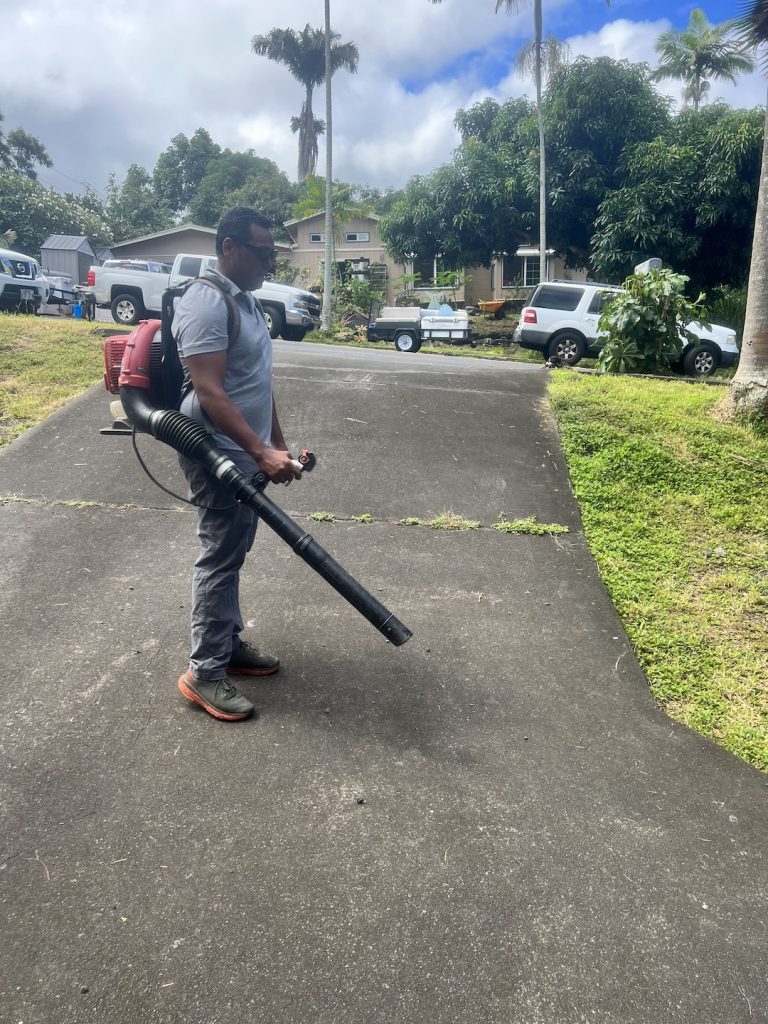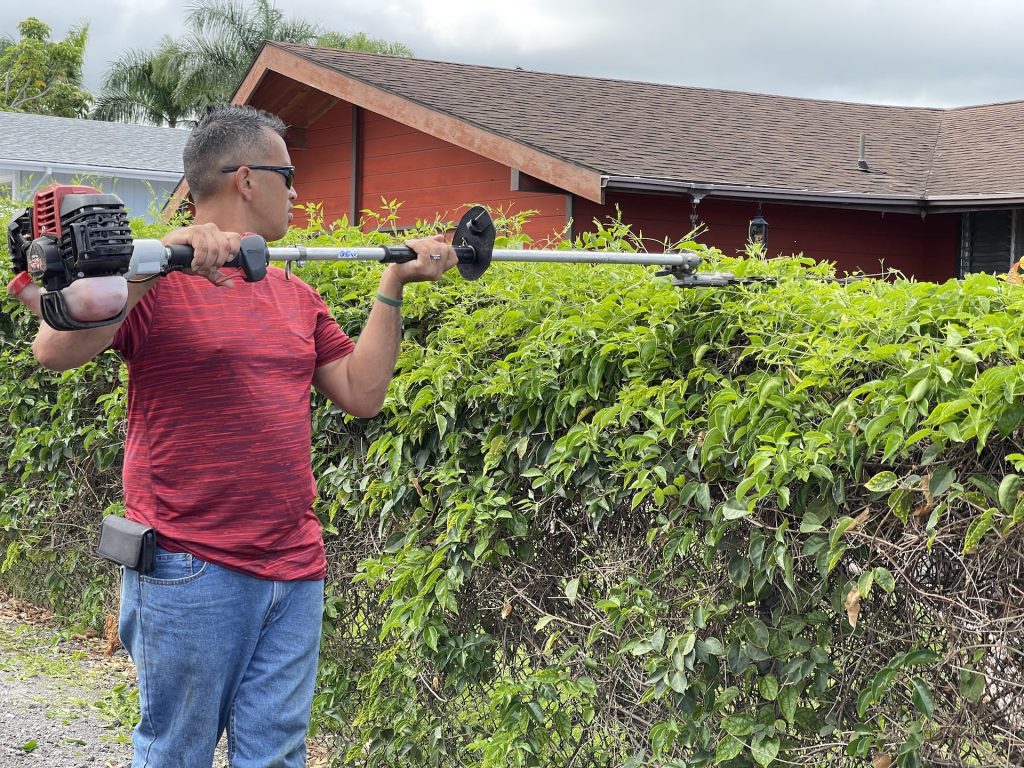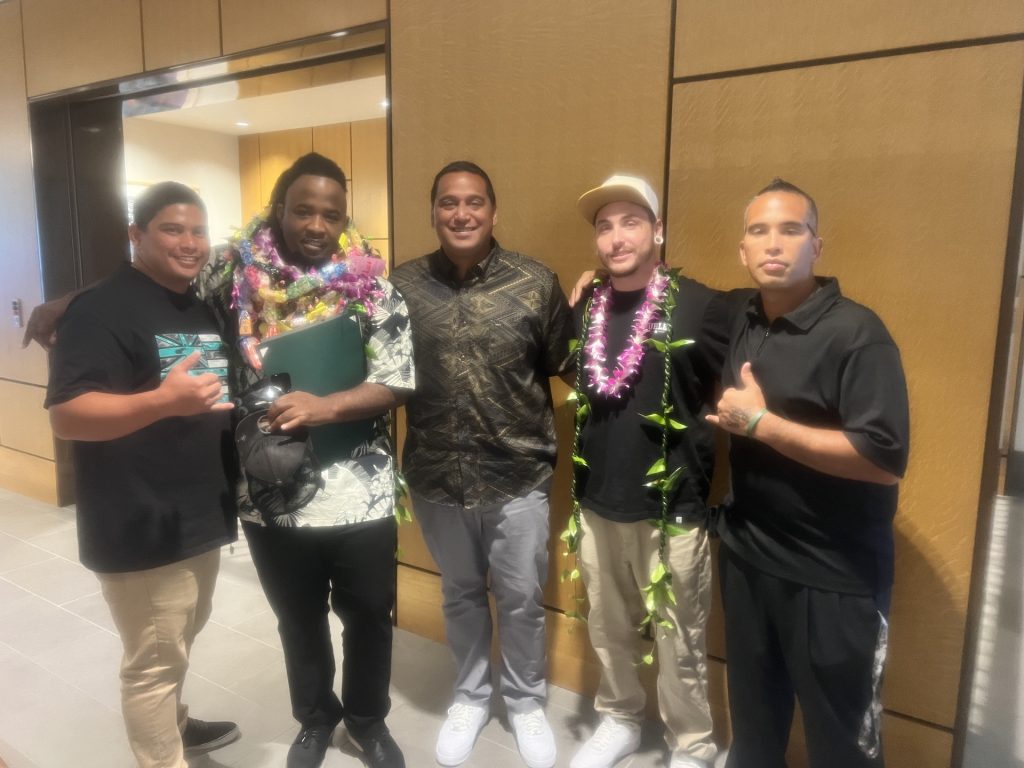Big Island drug addict who got clean starts lawn care business to help himself and his employees in recovery
The early morning sun was shining bright at the Lanihau Center in Kona when Sefa Ulu met his work crew of three men for breakfast, as he routinely does before they begin mowing lawns, manicuring hedges and doing other yard mainenance.
Ulu, a tall, mild-mannered man, laughed and talked story with the men. They are more than just his employees. They are people he cares deeply about, helping each one take it day by day to live a life of sobriety.
Their struggles once were his struggles. Ulu used to abuse substances for years: drinking, smoking and using cocaine and methamphetamine. In 2014, it caught up to him. He was arrested for drug offenses that included the serious felony of dealing meth.
At age 32, Ulu was facing 35 years in prison.

But he got a big break. Instead of being behind bars until he was a senior citizen, he served only 18 months before getting out in 2016, with probation. But that is not when his struggles ended. He went back to using, providing fake urine samples for his drug tests. It would take the support of his probation officer to get him into treatment and a 12-Step program that ultimately put him on a positive path.
To help his recovery, Ulu started We Care Lawn Care three years ago to create a “safe” work environment for himself. He also helps others, by giving people jobs and hiring people who are in recovery, too. They function as a support group.
Ulu is living proof for his workers that there is life after substance abuse and addiction. Now, at 40, Ulu now is a successful entrepreneur with 30 accounts. In June, he will marry his long-time girlfriend in front of her family in Missouri. He’s flying his mom and three kids to the mainland for the ceremony.
Ulu also shows how helping others helps in his own ongoing recovery. He also is actively involved in sponsoring people in Drug Court and Narcotics Anonymous, and is a regular at support meetings, providing fellowship and mentorship.
“I really believe I have a gift that I can help people,” Ulu said. “I put extra time into others. I give them everything I got. I have a purpose today and I try to fulfill that purpose.”
Ulu can tell them about his own battles to stop using drugs — about not knowing how to get clean made him feel like he didn’t want to.
He can tell them about the turning point when he confessed to his probation officer about his relapse.
“I don’t know why I confessed, I’d always lie,” Ulu said. “But my body couldn’t do it anymore. I told my probation officer to send me back to prison.”
Ulu can tell them about how the probation officer didn’t give up on him, but instead got him into an outpatient treatment with Care Hawai‘i, an organization that provides help with substance abuse and got him started on a 12-step program.
The program gives those in recovery the tools needed to overcome addictions and compulsions, and includes going to Narcotics Anonymous, Alcoholics Anonymous or other support meetings.
Ulu can tell them how he struggled with employment. Three years ago he was working at Kona Village for Ali‘i Builders when he decided to start his own business.
“My goal is to have a safe environment in all of life’s aspects, and my work is a big part of my life,” Ulu said. “It’s majority of the day.”
Ulu and his crew meet most mornings. They often talk how they are dealing with their individual recoveries. After breakfast and coffee, he assigns them to clients across West Hawaiʻi to work on their yards.
Ulu supports his employee’s by providing flexible schedules to work around their individual treatment programs. If they need to leave to take a drug test, that’s never a problem. And he has a strict policy: no drinking or drugs, including marijuana.
Joey Valenzuela said his job working at We Care Lawn Care for the past two years has been key to his recovery. Ulu not only is his boss, but also his sponsor.
“Working with my sponsor in a clean environment helps keep me sober,” the 37-year-old Valenzuela said. “I like working outside. It keeps my head not all scattered. It keeps me in place.”
Valenzuela was in and out of jail for years for traffic crimes. Every time he was released, he’d get clean for a few months and then fall back into substance abuse. In 2020, after getting out of jail again, his wife had started her own drug treatment program and he was working on getting into a program with the Big Island Substance Abuse Council for 72 days. But two weeks later he was using again.
“It was bad because of the place we were living. I was living with a [meth] dealer who always had stuff,” Valenzuela said.
On the night he relapsed, Valenzuela had just finished building a rock wall for the landlord, who had kicked out the dealer and other renters. Alone and bored, he went to a friend’s house.
As they played darts, his friends started passing around meth. He said no the first two times it was offered, but not the third time. The next morning, he went home, broke down and cried. His stepdad called the treatment center to push to get Valenzuela into the program.
Valenzuela was connected with Ulu through a family member and asked him to be his sponsor. He said he has been able to live a clean life now by cutting ties with people who do drugs and not having too much downtime.
Since 2020, Ulu also has mentored at least four people and provided at least six jobs to people in the Big Island Drug Court, coordinator Grayson Hashida said. The special court program provides treatment for youth and adults facing drug-related charges instead of putting them in jail.
“Sefa is unique in the sense he does a couple of things,” Hashida said. “He’s like a personal lifeline for people and he creates a safe work environment. Those in recovery really need that level of support.”
Hashida said Ulu seems to take on some of Drug Court’s most difficult cases: people who have a long history of homelessness, no family support in the state or an extremely long criminal history.
“Anyone who needs to speak to him, he’ll pick up the phone and always answer,” Hashida said.
Ulu currently is sponsoring 26-year-old Lincoln Dinson, a participant in Drug Court and now a part-time employee at We Care Lawn Care. He heard Ulu share at a Narcotics Anonymous meeting and felt a connection.
Dinson recalled the time he was facing the possibility of getting kicked out of a residential treatment program because of a failed drug test.
He called Ulu, who reminded him: “If you don’t pick up, you don’t relapse.”
The advice means more coming from somebody who has been in shoes. Dinson said: “He’s a big role model in my life. He’s an honest, hardworking man who’s willing to help when I need it.”
Ulu said the lawn care work is not difficult: “Most of it is just showing up.”
For some new in their recovery, many things can be difficult and triggering. To be an effective sponsor, Ulu said it’s important that he gets to know the person, their history and always be available when they’re upset, anxious or frustrated.
Employees stay with him until they find their own passion, which turns out to be cooking for a lot of them, Ulu said.
He is proud that his system of recovery has been working, for himself and his employees.
“Nobody who worked for me for the past year has gone out and used,” he said. “They might’ve had struggles, mistakes, but I’m more concerned about the person using.”
Just this month, two of Ulu’s sponsees and former employees, Michael Johnson and Jonah Farmer, graduated from Big Island Drug Court and have jobs working as cooks at local restaurants.
Johnson continues to lean on him as a sponsor.
“He takes the time to look out for people,” Johnson said. “When I was doing really bad, I called him up. He said he had faith in me and loved me.”
Editor’s note: This story is corrected to reflect that the business doesn’t just hire people in recovery.
Sponsored Content
Comments













